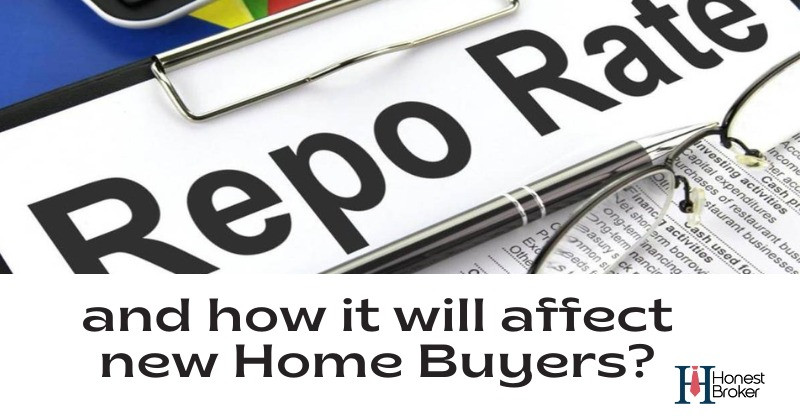 Blog
Blog
The Repo Rate is currently at 4.9%, despite the recent hike of 40 bps in May. The magnitude of the increase in EMIs for home loan borrowers will be affected by the revised lending rates. The repurchasing option rate or more commonly known as Equated Monthly Payments (EMI).
What does the Repo Rate mean for Homebuyers?
The repo rate will affect homebuyers who have chosen floating interest rates for their home loans. The interest rate is subject to market changes, as the name implies. These floating interest rates have an underlying minimum rate that banks and financial institutions cannot lend money below.
The repo rate can't change the EMIs for existing home loans, which are still subject to fixed interest rates. In this instance, the interest rate is slightly higher but is not subject to fluctuations.
The RBI reduces the repo rates when it wants to encourage spending. A reduction in the floating rate of interest and a subsequent decrease in the EMIs are the consequences of the repo rate cut.
A Recent Revision in the Repo Rate
The RBI recently increased its repo rate to try and stop inflation following the Ukraine–Russia Crisis. It is important to note that the RBI's repo rate increased by 25 basis points in August 2018 to 6.50 percent. The repo rate has remained stable or declined over the years until April 2022. This is what explains the pandemic-induced slowdown. This made it an increase of 90 basis points. Current repo rates are at 4.9 percent. In response, many banks raised the Retail Prime Lending Rate (RPLR) and the Marginal Cost of Funds Based Loan Rate (MCLR). Let's examine the impact this change has on your home loan EMI.
Impact of Repo Rates on Home Loan Interest Rates
Understanding the impact of the repo rate hike on your monthly payment towards the loan is essential. However, it is also imperative to compare the EMIs that you paid before May 2022.
1. Impact of Repo Rate on a Nationalized Bank EMI
If you take out a home loan of Rs 30 lakh from Punjab National Bank or any other govt. bank over 20 years at a floating rate of 6.9 percent, your EMI will be approximately Rs 23,080. The repo rate increase will result in the interest rate being calculated at 7.4 percent. Your EMI will now be around Rs 23,980. The new interest rate will take effect on June 9, 2022. This means that your monthly payment will increase by Rs. 900.
2. Impact of Repo Rate on a Private bank EMI
If you took out the same home loan at ICICI Bank, your EMI was around 8.1 percent before the repo rates hike. The monthly payout would be approximately Rs 25,280. EMIs will increase to Rs 26,220 with a floating interest rate hike of 8.6 percent following the repo rate revision. This is effective as of June 8, 2022. The increase in EMI is approximately Rs 940.
Experts Agree
The recent repo rate increase has placed the average man in a quandary about his home loan. Despite these quick reactions, it's important to remember that the repo rates are still well below pre-COVID. Therefore, the current jump in repo rates will have a minimal effect on the monthly payment toward the home loan.
Ramesh Nair, CEO, India, and MD, Market Development, Asia, Colliers, shares, "Despite the difficult global environment, the Indian economy is strongly placed on a path to recovery. GDP growth is pegged as 7.2 per cent FY 2022-23. This equates to a nearly one-point increase in repo rates over the past month and is still lower than the 5.15 per cent pre-pandemic. This is an excellent time to buy a home, as real homebuyers will continue buying, unaffected by any marginal rate increases.
Must Read What is Compute Gross Income?
There are various ways to lower the EMI Burden which are as follows
You can extend your home loan term to reduce the EMI impact. The policy regarding the same can vary between banks depending on the borrower's age. You can also opt for partial prepayment. Before you decide to opt for it, make sure to read the terms and conditions.
Work-from-home became permanent due to the pandemic, and home was almost essential to life. Although hybrid work models are becoming more popular, working from home a few days a week is still necessary. The increased repo rate shouldn't discourage you from deciding to buy a home. As the monthly payment has not changed much, you may want to consult a financial advisor to help manage your expenses.
What is the time frame for the repo rate increase to be effective for borrowers?
The increase will be visible immediately for home loans with floating interest rates. Fixed-rate home loans will not be affected directly as banks must increase their deposit rate and MCLR.
What can borrowers do to lessen the impact?
You have several options to address this hike: you can refinance at a lower rate, increase your monthly EMIs or make regular prepayments.
Expected Benefits on Home Loans
The interest rates on deposits are expected to rise, which will provide some relief for the average person. The current low-interest-rate regime is ending. It's better to opt for a shorter-term Fixed deposit so your deposits don't lock at a lower rate for too long. If the interest rates are high, you can choose to have a longer-term fixed account. The bank will pass the savings on to the customer.





